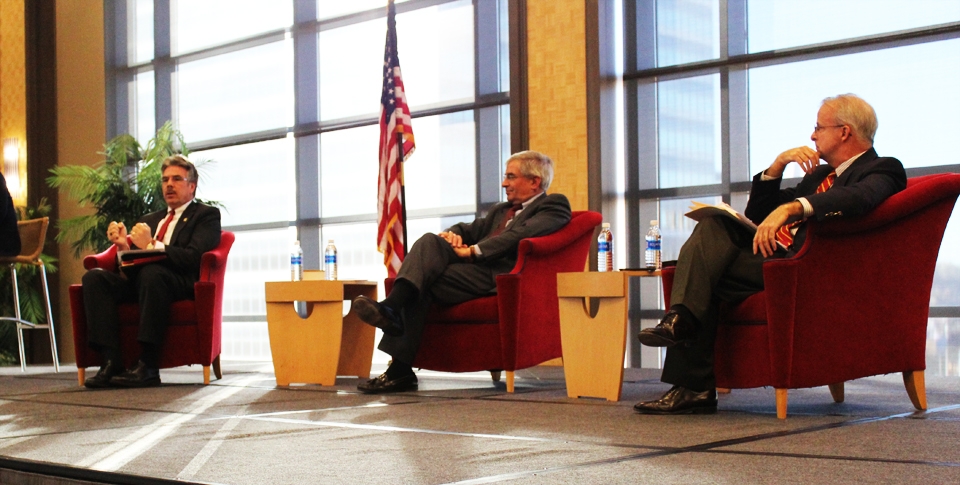

Duquesne President Ken Gormley (left) speaks at a Nov. 7 event about his book as Pittsburgh Post-Gazette Executive Editor David Shribman (center) and James Robenault (right), former chair of the business litigation goup at Thompson Hine LLP, listen on.
Liza Zulick | Staff Writer
A day before the 2016 presidential election, Duquesne President Ken Gormley held a discussion at Duquesne University on his newest book, “The Presidents and the Constitution: A Living History.”
On Nov. 7, Gormley held a presentation in Duquesne’s Power Center Ballroom to discuss questions about his book and the 2016 election.
“The point of writing this book was to show how presidencies are connected together over time,” Gormley said. “There are lots of threads that tie together history and presidencies.”
The book contains a chapter considering each president’s role in the history of shaping the United States Constitution.
Presidents like William Henry Harrison, Warren Harding, Woodrow Wilson and many others were mentioned during the book presentation to discuss how even the less famous presidents played important roles in history.
The book also describes key details about how each presidency interacted with the Constitution, including events such as the Watergate Scandal, vice presidential succession and Lincoln’s Code. Gormley emphasized the importance of each presidency on U.S. history throughout his book.
Gormley stressed the importance U.S. history has on all U.S. citizens. At his presentation, he described why learning about history helps a person make a good decision in politics today.
“You can’t understand any presidency without understanding the historical context,” Gormley said.
David Shribman, the executive editor of the Pittsburgh Post-Gazette who has been awarded the Pulitzer Prize in journalism for his coverage of national politics, and James Robenalt, former chair of the Business Litigation group at Thompson Hine LLP’s Cleveland office and author of three nonfiction books about the presidency, also joined Gormley on the stage during the presentation.
During the presentation, Lori Cox Han, a professor of political science at Chapman University in Orange, California, served as moderator while Gormley, Shribman and Robenalt discussed questions about the different sections of the book they had written.
Questions were also taken from the audience about the upcoming election, such as what is the great constitutional struggle of this presidency, and what is the biggest threat for our country’s future.
“Whoever becomes president is going to face a somewhat divided country, and we’ve seen this at different times in history,” Gormley said. “Whoever is elected on Tuesday is going to look seriously at the history of our country to bring our country together.”
Looking back on history, Gormley pointed out how much the past comes into play with this year’s election. Shribman pointed out that African-Americans were granted the right to vote right after the Civil War, and women were not allowed the vote until the 1920’s. Barack Obama served as the first African-American president before any woman did. However, Gormley said if Hillary Clinton were to win this year’s election, she would hold office during the 100 year anniversary of women being able to vote.
Rev. John Sawicki, a political science professor at Duquesne also understands the importance of the history of each president in Gormley’s book.
“If you look at the events in the past it is very clear that there are unsettled arguments that have long lingered in American politics that have not been resolved,” Sawicki said.
Gormley’s book was first released on May 10. The book brings together many different professionals to create a chapter for each of the 44 presidents and how they have worked to shape the Constitution.



